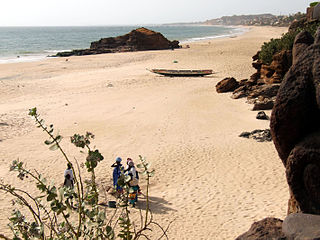
Predominantly rural, and with limited natural resources, the economy of Senegal gains most of its foreign exchange from fish, phosphates, groundnuts, tourism, and services. The agricultural sector of Senegal is highly vulnerable to variations in rainfall and changes in world commodity prices. The former capital of French West Africa, is also home to banks and other institutions which serve all of Francophone West Africa, and is a hub for shipping and transport in the region.
Telecommunications in Senegal include radio, television, fixed and mobile telephones, and the Internet.
This article describes the system of transport in Senegal, both public and private. This system comprises roads, rail transport, water transport, and air transportation.

Casamance is the area of Senegal south of the Gambia including the Casamance River. It consists of the Lower Casamance and the Upper Casamance. The largest city of Casamance is Ziguinchor.

Gum arabic, also known as acacia gum, arabic gum, gum acacia, acacia, Senegal gum and Indian gum, and by other names, is a natural gum consisting of the hardened sap of various species of the acacia tree. Gum arabic is collected from acacia species, predominantly Acacia senegal and Vachellia (Acacia) seyal. The term "gum arabic" does not indicate a particular botanical source. In a few cases so‐called "gum arabic" may not even have been collected from Acacia species, but may originate from Combretum, Albizia or some other genus. The gum is harvested commercially from wild trees, mostly in Sudan (80%) and throughout the Sahel, from Senegal to Somalia—though it is historically cultivated in Arabia and West Asia.

Saint-Louis, or Ndar as it is called in Wolof, is the capital of Senegal's Saint-Louis Region. Located in the northwest of Senegal, near the mouth of the Senegal River, and 320 km north of Senegal's capital city Dakar, it has a population officially estimated at 176,000 in 2005. Saint-Louis was the capital of the French colony of Senegal from 1673 until 1902 and French West Africa from 1895 until 1902, when the capital was moved to Dakar. From 1920 to 1957, it also served as the capital of the neighboring colony of Mauritania.

Macky Sall is a Senegalese politician who has been President of Senegal since April 2012. He was re-elected President in the first round voting in February 2019 Senegalese presidential election. Under President Abdoulaye Wade, Sall was Prime Minister of Senegal from April 2004 to June 2007 and President of the National Assembly (Senegal) from June 2007 to November 2008. He was the Mayor of Fatick from 2002 to 2008 and held that post again from 2009 to 2012.

The Senegal national football team, nicknamed the Lions of Teranga, is the national association football team of Senegal and is controlled by the Senegalese Football Federation.

Tourism in Senegal is a vital part of the West African nation's economy.

Russia–Senegal relations related to bilateral foreign relations between Russia and Senegal. Russian has an embassy in Dakar and Senegal has an embassy in Moscow.
Senegal is a source, transit, and destination country for children and women trafficked for the purposes of forced labor and commercial sexual exploitation. Trafficking within the country is more prevalent than trans-border trafficking and the majority of victims are children. Within Senegal, religious teachers traffic boys, called talibe, by promising to educate them, but subjecting them instead to forced begging and physical abuse. A 2007 study done by UNICEF, the ILO, and the World Bank found that 6,480 talibe were forced to beg in Dakar alone. Women and girls are trafficked for domestic servitude and sexual exploitation, including for sex tourism, within Senegal. Transnationally, boys are trafficked to Senegal from The Gambia, Mali, Guinea-Bissau, and Guinea for forced begging by religious teachers. Senegalese women and girls are trafficked to neighboring countries, the Middle East, and Europe for domestic servitude and possibly for sexual exploitation. Women and girls from other West African countries, particularly Liberia, Ghana, Sierra Leone, and Nigeria may be trafficked to Senegal for sexual exploitation, including for sex tourism.
The media of Senegal is varied and includes multiple television channels, numerous private radio stations, and over 15 newspapers.
Sud Quotidien is a major independent daily newspaper in Senegal.
WalFadjri is an independent daily newspaper published in Senegal. It is a French newspaper. It was owned by Sidy Lamine Niasse.
Le Populaire is a major independent daily newspaper in Senegal.
Senegal's major source of electricity is mostly diesel and gas, with an installed capacity of 633 MW.
Senegal’s high population growth and migration from the rural areas to Dakar has resulted in the mushrooming of squatter settlements on Dakar’s periphery.









